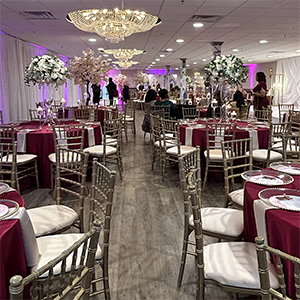Essential Considerations When Choosing Your Wedding Venue
Selecting the perfect wedding venue stands as one of the most crucial decisions in the wedding planning process. This choice influences nearly every other aspect of your celebration, from the guest list to the photography style. The venue sets the tone for your entire celebration and can either simplify or complicate your planning journey. Before signing a contract, consider these five critical factors that will shape your venue decision.
1. Location Logistics and Accessibility
The geographical placement of your venue extends far beyond a simple address on a map. Consider the venue’s proximity to accommodations for out-of-town guests and its accessibility via major transportation routes. Urban venues might offer convenience but often come with parking challenges, while rural settings may provide scenic beauty at the cost of transportation complexity.
Take Sarah and Michael’s experience with their venue they selected in the far western suburbs of Chicago, IL, for instance. They fell in love with a picturesque barn venue two hours outside the city but quickly realized the logistical challenges. “We had to arrange shuttle services from three different hotels and create detailed maps for vendors who had never been to the area,” Sarah shares. “While the photos were stunning, we spent a significant portion of our budget on transportation alone.” Their story underscores the importance of thinking through guest travel arrangements and vendor access.
Consider whether your guests will need to navigate between multiple locations (ceremony, reception, accommodations) and how this might impact their experience. A venue that offers on-site ceremonies or is within walking distance of major hotels can significantly enhance guest convenience and participation.
2. Value Proposition and Hidden Costs
While the base rental fee often appears straightforward, the true value of a venue lies in understanding its complete financial impact. Many venues offer packaged services that might initially seem expensive but actually represent significant value when compared to sourcing individual vendors.
Jessica and David’s experience highlights this point perfectly. “We initially chose a bare-bones venue because the rental fee was low,” Jessica explains. “But after adding up rentals for tables, chairs, linens, lighting, tent backup for rain, and kitchen equipment for the caterer, we actually exceeded the cost of the all-inclusive venue we had dismissed as too expensive.”
Examine what’s included in your venue contract:
– Basic furniture and equipment (tables, chairs, linens)
– Audio-visual systems and lighting
– Kitchen facilities and vendor prep areas
– Staff support and security
– Setup and breakdown time
– Insurance requirements
– Weather contingency plans
Be particularly vigilant about identifying potential hidden costs such as mandatory vendor lists, overtime fees, or cleanup charges that could impact your budget unexpectedly. Request a detailed breakdown of all possible fees and carefully review the payment schedule.
3. Management Professionalism and Communication
The quality of venue management can make or break your wedding experience. Professional venue managers should demonstrate prompt communication, transparent policies, and a willingness to accommodate reasonable requests. Pay attention to how they handle initial inquiries and whether they provide detailed, written responses to your questions.
Consider Emma and James’s wedding planning journey when they selected to hold their reception at the Royal Palace Event Centre in Joliet, IL: “Our venue coordinator, Lisa, made all the difference,” Emma recalls. “When our original florist canceled two weeks before the wedding, she immediately connected us with three alternatives who knew the venue well and could work within our style and budget. Her proactive communication style kept us calm throughout the entire planning process.”
Look for management teams that:
– Respond promptly to communications (within 24-48 hours)
– Provide detailed, written policies and contracts
– Offer organized planning tools and checklists
– Have experience handling unexpected situations
– Maintain positive relationships with local vendors
– Demonstrate knowledge of current wedding trends and requirements
4. Capacity and Space Configuration
Beyond simple headcount considerations, evaluate how the space flows for your intended wedding format. The venue should comfortably accommodate your guest list while allowing for distinct areas for different activities—ceremony, cocktail hour, dining, and dancing.
One couple, Alex and Jordan, learned this lesson firsthand. “Our venue looked massive during our first visit,” Alex shares, “but once we did a walk-through with our planner, we realized that fitting 200 guests plus a dance floor would make the space feel cramped. We ended up reducing our guest list to 150, which created the perfect balance of intimacy and comfort.”
Consider whether the space feels cramped at maximum capacity and if there’s a contingency plan for inclement weather if outdoor spaces are involved. The flexibility of the space to adapt to your vision without requiring excessive decorative transformation can significantly impact both your budget and setup time.
5. Vendor Policies and Restrictions
Many venues influence your wedding far beyond providing physical space through their vendor policies. Some require you to work exclusively with their preferred vendors, while others maintain an approved list or allow complete freedom of choice.
Rachel and Thomas encountered this challenge at their dream venue. “We had our heart set on a specific caterer who had been part of our families’ celebrations for years,” Rachel explains. “Finding out that our venue required us to use their in-house catering was a deal-breaker, leading us to find an equally beautiful space that allowed outside vendors.”
Understanding these restrictions early helps prevent conflicts between your vision and venue requirements. Additionally, investigate policies regarding:
– Setup and breakdown times
– Decoration restrictions and hanging methods
– Music volume limitations and curfews
– Alcohol service requirements and licensing
– Photography and videography restrictions
– Insurance requirements for outside vendors
Conclusion
Your venue choice sets the foundation for your entire wedding celebration. By carefully evaluating these five aspects—location logistics, value proposition, management quality, space configuration, and vendor policies—you’ll be better equipped to select a venue that not only meets your aesthetic preferences but also provides a practical and enjoyable setting for your celebration.
Remember that the perfect venue balances your vision with logistical practicality, creating an environment where cherished memories can naturally unfold. Take your time with this decision, ask thorough questions, and trust your instincts. After all, this space will be the backdrop for one of life’s most significant celebrations and the starting point of your new journey together.
This post was created with our nice and easy submission form. Create your post!




Comments
0 comments